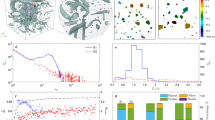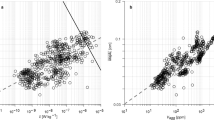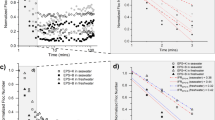Abstract
INORGANIC sediment suspended in the sea is unstable as single mineral particles and occurs as flocculated aggregates with settling speeds many times greater than that of the constituent grains. This has been demonstrated both through observations of natural samples1–5 and through laboratory experiments6,7. In near-shore waters with high concentrations of terrestrially derived mineral matter the transport and deposition of fine sediment are greatly affected by flocculation. The exact mechanism of floc formation in the sea is not well understood. The concentration, mineralogy and grain size of the suspended particles and the salinity, turbulence and temperature of the water are commonly regarded as controlling factors8,9. Flocculated aggregates composed largely of organic matter have been observed in the sea10,11 and organic matter may be an important ingredient in the flocculation of inorganic sediment.
This is a preview of subscription content, access via your institution
Access options
Subscribe to this journal
Receive 51 print issues and online access
$199.00 per year
only $3.90 per issue
Buy this article
- Purchase on Springer Link
- Instant access to full article PDF
Prices may be subject to local taxes which are calculated during checkout
Similar content being viewed by others
References
Berthois, L., Revue Géogr. phys. Géol. dyn., 4, 1, 39 (1961).
Biddle, P., and Miles, J. H., Sediment. Geol., 7, 23 (1972).
Krone, R. B., Flume Studies of the Transport of Sediment in Estuarial Shoaling Processes (Hydraulic Engineering Laboratory and Sanitary Engineering Research Laboratory, University of California, Berkeley, 1962).
Schubel, J. R., Powder Technol., 6, 9 (1972).
Sheldon, R. W., Limnol. Oceanogr., 13, 72 (1968).
Gripenberg, Stina, Fennia, 60, 3 (1934).
Whitehouse, V. G., Jeffrey, L. M., and Debrecht, J. D., Proc. Seventh natn. Conf. Clays and Clay Minerals (National Academy of Sciences—National Research Council, 1 - 76, 1960).
Committee on Tidal Hydraulics, Corps of Engineers, U.S. Army. Tech. Bull., 4 (1960).
Whitehouse, V. G., and Jeffrey, L. M., Symp. Tidal Hydraulics, New York (United States Army Corps of Engineers Committee on Tidal Hydraulics, Report, 1954).
Riley, G. A., Limnol. Oceanogr., 8, 372 (1963).
Gordon, D. C., Deep-Sea Res., 17, 175 (1970).
Sheldon, R. W., and Parson, T. R., A Practical Manual on the Use of the Coulter Counter in Marine Sciences (Coulter Electronics, Toronto, 1967).
Sheldon, R. W., and Parsons, T. R., J. Fish. Res. Bd Can., 24, 909 (1967).
Hjulstrom, R., in Recent Marine Sediments (edit. by Trask, P. D.), 5–31 (American Association of Petroleum Geologists, Tulsa, 1939).
Hahn, H. H., and Stumm, W., Am. J. Sci., 268, 354 (1970).
Packham, R. F., J. appl. Chem., 12, 556 (1962).
Van Olphen, H., An Introduction to Clay Colloid Chemistry (Interscience, New York, 1966).
Author information
Authors and Affiliations
Rights and permissions
About this article
Cite this article
KRANCK, K. Flocculation of Suspended Sediment in the Sea. Nature 246, 348–350 (1973). https://doi.org/10.1038/246348a0
Received:
Revised:
Issue Date:
DOI: https://doi.org/10.1038/246348a0
This article is cited by
-
Variability of Cohesive Particle Characteristics in an Energetic Estuary: Flocs vs. Aggregates
Estuaries and Coasts (2020)
-
Temporal and spatial changes in grain size on a macro-tidal channel-flat complex: results from Kingsport, Nova Scotia, Bay of Fundy
Ocean Dynamics (2019)
-
Distinction and grain-size characteristics of intertidal heterolithic deposits in the middle Qiantang Estuary (East China Sea)
Geo-Marine Letters (2015)
-
Observations and analyses of floc size and floc settling velocity in coastal salt marsh of Luoyuan Bay, Fujian Province, China
Acta Oceanologica Sinica (2010)
-
Biogeochemical Zones Within a Macrotidal, Dry-Tropical Fluvial-Marine Transition Area: A Dry-Season Perspective
Aquatic Geochemistry (2010)
Comments
By submitting a comment you agree to abide by our Terms and Community Guidelines. If you find something abusive or that does not comply with our terms or guidelines please flag it as inappropriate.



